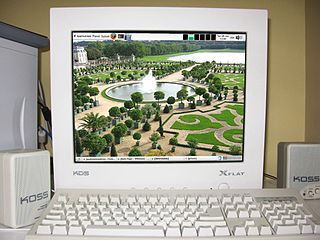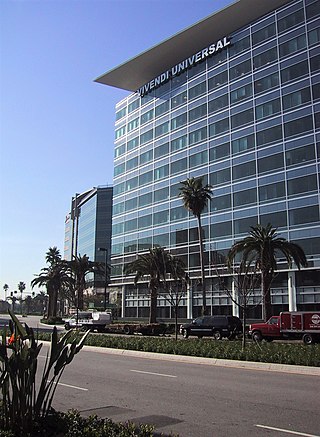Sierra Entertainment, Inc. was an American video game developer and publisher founded in 1979 by Ken and Roberta Williams. The company is known for pioneering the graphic adventure game genre, including the first such game, Mystery House. It is known for its graphical adventure game series King's Quest, Space Quest, Police Quest, Gabriel Knight, Leisure Suit Larry, and Quest for Glory, and as the original publisher of Valve's Half-Life series.
Desktop publishing (DTP) is the creation of documents using dedicated software on a personal ("desktop") computer. It was first used almost exclusively for print publications, but now it also assists in the creation of various forms of online content. Desktop publishing software can generate page layouts and produce text and image content comparable to the simpler forms of traditional typography and printing. This technology allows individuals, businesses, and other organizations to self-publish a wide variety of content, from menus to magazines to books, without the expense of commercial printing.

The Macintosh Classic is a personal computer designed, manufactured and sold by Apple Computer from October 1990 to September 1992. It was the first Macintosh to sell for less than US$1,000.
The history of macOS, Apple's current Mac operating system formerly named Mac OS X until 2011 and then OS X until 2016, began with the company's project to replace its "classic" Mac OS. That system, up to and including its final release Mac OS 9, was a direct descendant of the operating system Apple had used in its Mac computers since their introduction in 1984. However, the current macOS is a UNIX operating system built on technology that had been developed at NeXT from the 1980s until Apple purchased the company in early 1997.

The Apple IIGS is a 16-bit personal computer produced by Apple Computer. It is the fifth and most powerful of the Apple II family. It is compatible with earlier Apple II models but has a Macintosh look and feel, and resolution and color similar to the Amiga and Atari ST. The "GS" in the name stands for "Graphics and Sound", referring to its enhanced multimedia hardware, especially its state-of-the-art audio.

XScreenSaver is a free and open-source collection of 240+ screensavers for Unix, macOS, iOS and Android operating systems. It was created by Jamie Zawinski in 1992 and is still maintained by him, with new releases coming out several times a year.

The Macintosh, later rebranded as the Macintosh 128K, is the original Macintosh personal computer, from Apple. It is the first successful mass-market all-in-one desktop personal computer with a graphical user interface, built-in screen, and mouse. It was pivotal in establishing desktop publishing as a general office function. The motherboard, a 9 in (23 cm) CRT monochrome monitor, and a floppy drive are in a beige case with integrated carrying handle; it has a keyboard and single-button mouse. The Macintosh was introduced by a television commercial titled "1984" during Super Bowl XVIII on January 22, 1984, and directed by Ridley Scott. Sales were strong at its initial release on January 24, 1984, at $2,495, and reached 70,000 units on May 3, 1984. Upon the release of its successor, the Macintosh 512K, it was rebranded as the Macintosh 128K. The computer's model number is M0001.

Connectix Corporation was a software and hardware company, noted for having released innovative products that were either made obsolete as Apple Computer incorporated the ideas into system software, or were sold to other companies once they became popular. It was formed in October 1988 by Jon Garber; dominant board members and co-founders were Garber, Bonnie Fought, and close friend Roy McDonald. McDonald was still Chief Executive Officer and president when Connectix finally closed in August 2003.

A wallpaper or background is a digital image used as a decorative background of a graphical user interface on the screen of a computer, smartphone or other electronic device. On a computer, wallpapers are generally used on the desktop, while on a mobile phone they serve as the background for the home screen. Though most devices include a default background image, modern devices usually allow users to manually change the background image.

After Dark is a series of computer screensaver software introduced by Berkeley Systems in 1989 for the Apple Macintosh, and in 1991 for Microsoft Windows.

Radius Inc. was an American computer hardware firm founded in May 1986 by Burrell Smith, Mike Boich, Matt Carter, Alain Rossmann and joined by other members of the original Macintosh team like Andy Hertzfeld. The company specialized in Macintosh peripherals and accessory equipment. It completed its IPO in June 1990.

In computing, a virtual desktop is a term used with respect to user interfaces, usually within the WIMP paradigm, to describe ways in which the virtual space of a computer's desktop environment is expanded beyond the physical limits of the screen's display area through the use of software. This compensates limits of the desktop area and is helpful in reducing clutter of running graphical applications.

Delrina Corporation was a Canadian software company active from 1988 to 1995. The company was best known for WinFax, a software package which enabled computers equipped with fax modems to transmit copies of documents to standalone fax machines or other similarly equipped computers. It also sold PerForm and FormFlow, electronic form software. Delrina was acquired by the American software firm Symantec in 1995.
Wes Boyd is an American software developer and political organizer. In 1987, he and his wife Joan Blades co-founded Berkeley Systems, a San Francisco Bay area software company. After selling the company in 1997, Boyd and Blades went on to found the liberal political group MoveOn.org in 1998.
CUC (Comp-U-Card) International Inc. was a membership-based consumer services conglomerate with travel, shopping, auto, dining, home improvement and financial services offered to more than 60 million customers worldwide based in Stamford, Connecticut, US, and founded in 1973 by Kirk Shelton and Walter Forbes. In 1998, it became involved in a Securities and Exchange Commission investigation into what, at the time, was the biggest accounting scandal in corporate history.
WinFax is a discontinued Microsoft Windows-based software product developed and published by Delrina designed to let computers equipped with fax-modems communicate directly to stand-alone fax machines, or other similarly equipped computers.

Thirty Seconds Over Winterland is an album by the American psychedelic rock band Jefferson Airplane. It was recorded live in August and September 1972, at the Auditorium Theatre in Chicago and the Winterland Ballroom in San Francisco. It was released in April 1973; reflecting the band's declining commercial stature, it only peaked at No. 52 on the Billboard chart.

Vivendi Games was an American video game publisher and holding company based in Los Angeles. It was founded in 1996 as CUC Software, the publishing subsidiary of CUC International, after the latter acquired video game companies Davidson & Associates and Sierra On-Line. Between 1997 and 2001, the company switched parents and names multiple times before ending up organized under Vivendi Universal. On July 10, 2008, Vivendi Games merged with Activision to create Activision Blizzard.
The following outline of Apple Inc. is a topical guide to the products, history, retail stores, corporate acquisitions, and personnel under the purview of the American multinational corporation Apple Inc.
Comparison of user features of operating systems refers to a comparison of the general user features of major operating systems in a narrative format. It does not encompass a full exhaustive comparison or description of all technical details of all operating systems. It is a comparison of basic roles and the most prominent features. It also includes the most important features of the operating system's origins, historical development, and role.











